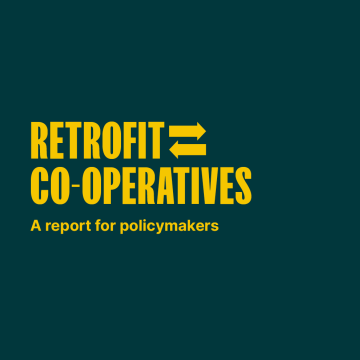70,000 reasons for government to back co-operatives: A blog
Blog post

The latest blog from our Policy and Development Lead makes the case for unlocking rapid co-operative growth and creating 70,000 good green jobs.
The prospect of decent green jobs makes the energy transition more sellable to a wary public, writes James Wright, Policy and Development Lead at Co-operatives UK. Yet our politicians hold back, for fear of looking fiscally irresponsible. In this position, they can’t afford to overlook the potential for co-operatives to deliver 70,000 good green jobs, right across the economy, off their own back.
Green jobs
Most of the debate on green jobs focuses on the investment needed to kickstart the UK’s nascent low carbon industries, like offshore wind, gigafactories and heat pumps. But vital as this is, our conception of ‘decent green jobs’ must also encompass rapidly decarbonising firms and sectors right across the economy. It must include small businesses and everyday sectors like services, retail and food production. This is where most people work. It’s where some of the hardest yards of decarbonisation lie. And where decent jobs are harder to find.
Superpowers
Here, co-operatives and other democratic businesses have an invaluable superpower. Evidence shows they are significantly more likely to both decarbonise and create decent jobs, and not just in high-value green industries, but right across the ‘everyday’ economy. For example, consumer co-operatives lead the way in retail with science-based net zero targets and inclusive employment practices. And worker co-operatives in warehousing and distribution combine higher pay and enhanced wellbeing with superior climate action.
On top of this, some types of co-operative play an important and distinctive role in enabling communities, businesses and households to change behaviour and adopt new technologies. This includes community energy, retrofit, and farmers’ co-operatives. These ‘transition co-operatives’ are involving more people, in more areas of life, in our national effort to reach net zero. In doing so, they generate strong local benefits including decent jobs in their communities.
Drawing on recent research on decarbonisation and job creation in the democratic economy, Co-operatives UK believes a thriving co-operative sector would generate at least 70,000 decent green jobs over five to 10 years.
Policy priorities
The next government should implement a strategy to unlock rapid co-operative growth, in green industries and across the everyday economy. The UK’s leading co-operatives have backed a policy platform, setting out four policy priorities for enabling this. They aren’t asking for public money, but rather for the government to enable businesses and communities to do it themselves, by unlocking new capital raising options, modernising legislation and ensuring access to specialist advice and support. Doing so will ensure that whatever public money is available for the green transition goes further, not just in driving societal change, but also in terms of sharing economic benefits and winning hearts and minds.

Green jobs: A case for co-operative growth

Guest blog: How is Suma Wholefoods moving towards its Net Zero ambition?

A Call for Co-operative Growth

